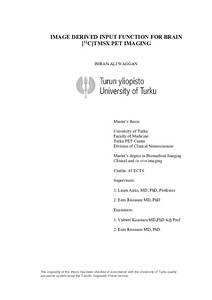The Significance of Language Input in the Production of Output Skills : A Qualitative Content Analysis on the Beliefs of Students of English
Saarinen, Oskari (2025-01-10)
The Significance of Language Input in the Production of Output Skills : A Qualitative Content Analysis on the Beliefs of Students of English
Saarinen, Oskari
(10.01.2025)
Julkaisu on tekijänoikeussäännösten alainen. Teosta voi lukea ja tulostaa henkilökohtaista käyttöä varten. Käyttö kaupallisiin tarkoituksiin on kielletty.
avoin
Julkaisun pysyvä osoite on:
https://urn.fi/URN:NBN:fi-fe202502059681
https://urn.fi/URN:NBN:fi-fe202502059681
Tiivistelmä
The topic of the thesis focuses on university students’ beliefs on the significance of language
input in the production of L2 English output skills. It aims to investigate participants’ beliefs
on how they have received extensive input from formal and informal settings and how their
accessed sources of written and spoken input are significant and useful for their L2 English
writing and speaking. The total number of participants is 48. The present study utilizes a
questionnaire with open-ended questions as a data collection method. Qualitative content
analysis is applied as the method for data analysis, which also involves coding of
participants’ responses. According to the results of the present study, participants had strong
beliefs that receiving extensive input was preferable in informal settings both in terms of L2
writing and speaking. Participants also believe that sources of written (e.g. books, online
texts) and spoken input (e.g. TV, music, and YouTube videos) were significant and useful for
increasing their intrinsic motivation, improving output skills and raising awareness of how
English is used and adapted in different contexts. The study managed to provide sufficient
results on the significance of language input from the student belief perspective, however,
there is uncertainty whether the findings can reflect the reality on a larger scale, indicating
possible future directions to this topic.
input in the production of L2 English output skills. It aims to investigate participants’ beliefs
on how they have received extensive input from formal and informal settings and how their
accessed sources of written and spoken input are significant and useful for their L2 English
writing and speaking. The total number of participants is 48. The present study utilizes a
questionnaire with open-ended questions as a data collection method. Qualitative content
analysis is applied as the method for data analysis, which also involves coding of
participants’ responses. According to the results of the present study, participants had strong
beliefs that receiving extensive input was preferable in informal settings both in terms of L2
writing and speaking. Participants also believe that sources of written (e.g. books, online
texts) and spoken input (e.g. TV, music, and YouTube videos) were significant and useful for
increasing their intrinsic motivation, improving output skills and raising awareness of how
English is used and adapted in different contexts. The study managed to provide sufficient
results on the significance of language input from the student belief perspective, however,
there is uncertainty whether the findings can reflect the reality on a larger scale, indicating
possible future directions to this topic.
Samankaltainen aineisto
Näytetään aineisto, joilla on samankaltaisia nimekkeitä, tekijöitä tai asiasanoja.
-
IMAGE DERIVED INPUT FUNCTION FOR BRAIN [11C]TMSX PET IMAGING
Waggan, Imran (05.04.2019)Modeling and analysis of positron emission tomography (PET) imaging data requires the critical information of the input function of the radioligand used. In PET imaging of the brain, the ‘gold standard’ for acquiring input ...avoin -
The Role of The Environment and Heritage Language Instructions as an Input Factor in Literacy Development : The Case of Kurdish Bilingual Children in Finland
Goyi, Siddik (21.12.2023)This master’s thesis is written in the field of language education within the framework of immigrant languages in host countries. It aims to investigate the impacts of the environmental conditions, such as family dynamics, ...avoin -
Copyright and Machine Learning: from human-created input to computer-generated output
Kublik, Vadym (12.12.2018)This thesis examines the legality of unauthorized reproduction of in-copyright works for the purpose of being used in Machine Learning processes. It focuses primarily on US and EU copyright systems as environments for ...avoin



